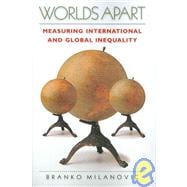
Note: Supplemental materials are not guaranteed with Rental or Used book purchases.
Purchase Benefits
What is included with this book?
| Acknowledgments | p. vii |
| Prologue: The Promise of the Twentieth Century | p. 1 |
| Introduction: A Topic Whose Time Has Come | p. 3 |
| Setting the Stage | |
| The Three Concepts of Inequality Defined | p. 7 |
| Other Differences between the Concepts | p. 12 |
| International and World Inequality Compared | p. 20 |
| Inequality Among Countries | |
| Rising Differences in Per Capita Incomes | p. 31 |
| Regional Convergence, Divergence, or..."Vergence" | p. 45 |
| The Shape of International GDP Per Capita Distribution | p. 51 |
| Winners and Losers: Increasing Dominance of the West | p. 61 |
| Global Inequality | |
| Concept 2 Inequality: Decreasing in the Past Twenty Years | p. 85 |
| High Global Inequality: No Trend? | p. 101 |
| A World without a Middle Class | p. 128 |
| Concluding Comments | |
| The Three Concepts of Inequality in Historical Perspective | p. 139 |
| Why Does Global Inequality Matter and What to Do about It? | p. 149 |
| Appendixes 1-7 | p. 163 |
| Notes | p. 195 |
| References | p. 213 |
| Index of Authors | p. 223 |
| Index of Subjects | p. 225 |
| Table of Contents provided by Ingram. All Rights Reserved. |
The New copy of this book will include any supplemental materials advertised. Please check the title of the book to determine if it should include any access cards, study guides, lab manuals, CDs, etc.
The Used, Rental and eBook copies of this book are not guaranteed to include any supplemental materials. Typically, only the book itself is included. This is true even if the title states it includes any access cards, study guides, lab manuals, CDs, etc.